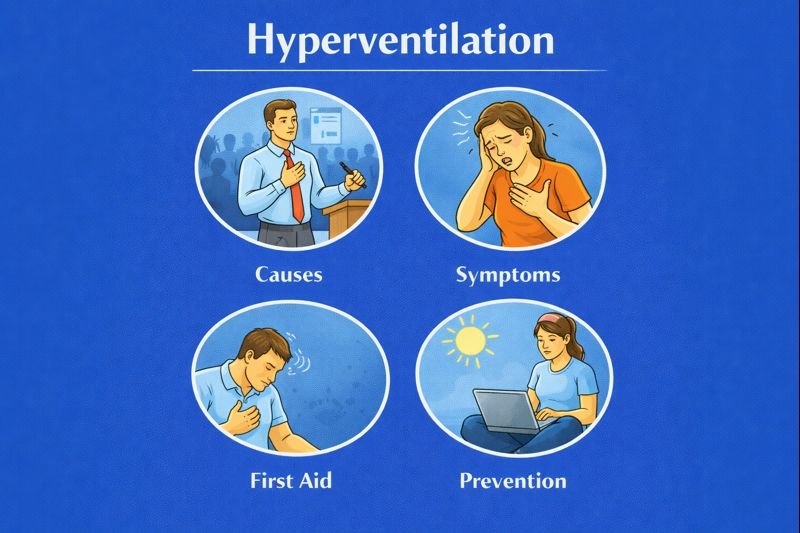Hyperventilation: Causes, Symptoms & First Aid Awareness

Some individuals experience hyperventilation syndrome, in which over-breathing patterns occur during specific triggers such as anxiety, stress, or heightened awareness of bodily sensations.
Relevance in Canadian First Aid, Workplaces & Daily Life
Hyperventilation can occur during workplace stress, performance situations, athletic training, public speaking, challenging conversations, or emotionally intense events. Hyperventilation awareness supports calmer responses and helps reduce fear around symptoms.
Scenario (Mild & Realistic)
Before a university presentation, Mateo felt nervous and started breathing quickly. He paused, sat down, and focused on slower breathing. After a few minutes, he felt steadier and completed the presentation.
Causes & Contributing Factors
Common triggers may include:
-
Stress or anxiety
-
Strong emotions
-
Pain or fear
-
Fatigue or overexertion
-
Anticipatory stress (e.g., performance or exams)
-
Environmental stressors (crowds, heat, fast-paced tasks)
Not all hyperventilation is emotional; some individuals over-breathe without a clear trigger.
Symptoms of Hyperventilation
Hyperventilation can affect different body systems. Symptoms may include:
Nervous System or Sensory Symptoms
-
Light-headedness or dizziness
-
Tingling in hands or face
-
Warm or cool sensations
-
Mild confusion or “foggy” feeling
-
Feeling detached or “out of body”
-
Vision changes or spots
Chest or Breathing Sensations
-
Rapid or deep breathing
-
Difficulty taking a “satisfying” breath
-
Sensation of shortness of breath
-
Sighing or yawning frequently
Digestive Symptoms
-
Bloating or burping
-
Stomach discomfort or pressure
Emotional or Cognitive Symptoms
-
Restlessness or agitation
-
Worry about breathing or health
-
Feeling overwhelmed by sensations
Symptoms may be brief or persistent, and intensity varies widely among individuals.
Understanding the Physiology (Educational)
During rapid breathing, carbon dioxide levels in the blood can decrease. This may contribute to tingling sensations, muscle twitching, or light-headedness. These effects are temporary and usually improve once breathing slows.
When to Seek Professional Evaluation
Individuals who experience frequent hyperventilation, unclear triggers, or symptoms during exercise may discuss this with a health professional. A clinician can help determine if symptoms relate to anxiety, breathing patterns, or another health condition.
First Aid & Self-Awareness Strategies (Non-Prescriptive)
People who recognize their patterns sometimes use calming strategies such as:
-
Pausing activity
-
Sitting or changing position
-
Slowing the pace of breathing
-
Focusing attention away from symptoms
-
Light movement or grounding exercises
Structured breathing and relaxation techniques are often learned through health or counselling professionals.
Prevention & Coping Considerations
Helpful approaches may include:
-
Regular hydration and balanced nutrition
-
Stress management or mindfulness practices
-
Gradual exposure to performance or stress triggers
-
Awareness of personal early warning signs
-
Workplace or school accommodations during high-pressure tasks
FAQ
Is hyperventilation dangerous?
Hyperventilation is usually not dangerous, but it can feel uncomfortable. Recurrent or unexplained symptoms may benefit from professional assessment.
Can hyperventilation happen without anxiety?
Yes. It can occur with exertion, stress, pain, or even without a clear emotional trigger.
Do people faint during hyperventilation?
Some may briefly feel light-headed or faint; experiences vary.
Can hyperventilation mimic other health issues?
Yes. Chest tightness and breathing changes may resemble other conditions, which is one reason assessment can be helpful if symptoms are new or persistent.
Educational Note
This article supports public and workplace education about hyperventilation and breathing awareness. Triggers and coping strategies vary widely. Trained health professionals can assess concerns that interfere with daily activities, performance, or quality of life.
